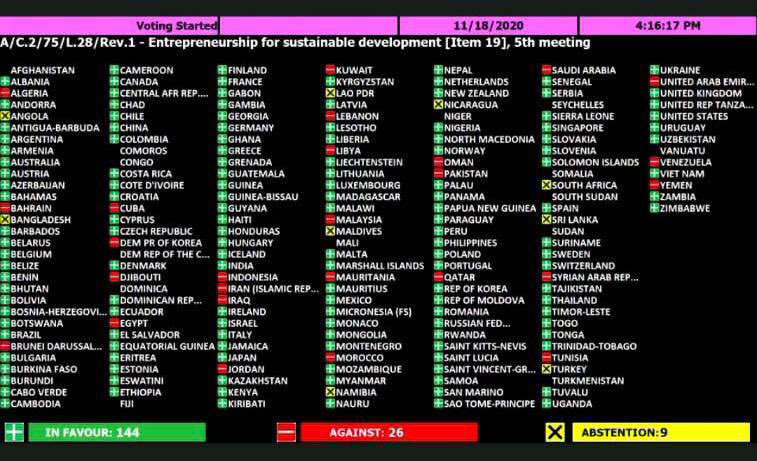
Featured Item

SA abstention on Israeli resolution could signal ‘a significant shift’
When the United Nations (UN) Second Committee passed an Israeli resolution on “Entrepreneurship for Sustainable Development” last week, it was supported by 144 nations. South Africa was one of only eight countries to abstain, but does the fact that South Africa didn’t vote against the resolution signal a shift in its approach to Israel?
The resolution supports the UN’s Agenda 2030 for Sustainable Development, and focuses on actions needed for post-COVID-19 recovery. According to a statement from the Israeli mission to the UN, the resolution will help to “remove barriers facing entrepreneurs and unleash the talent that is innate in all societies. It will increase access and opportunities for women, youth, and individuals with disabilities by promoting entrepreneurship education through capacity-building, training programmes, and business incubators.”
While this is something that South Africa could only benefit from, it chose to abstain from the vote. Yet in light of the country’s strained relationship with Israel, this could still be a positive move.
“It’s indeed interesting that South Africa seems no longer to be taking an activist position against Israel. Abstaining shows a significant shift,” says local political analyst Ralph Mathekga.
“Within a context in which South Africa hasn’t shied away from voting against Israel, this seems to indicate a shift in attitude. Abstaining is a big step from acting against Israel. The issues in the resolution are also concerns for South Africa, making it difficult to vote against the resolution.”
But local political analyst Steven Gruzd disagrees. “I don’t think we can declare a shift based on a single resolution, and this one wasn’t about the Palestinians, so perhaps it was easier for South Africa to abstain.
“South Africa routinely votes against Israel in the UN. Another explanation might be that South Africa chairs the UN Security Council next month, and may not want to antagonise the big powers with this vote. And South Africa would most likely support the content of the resolution, but just couldn’t bring itself – ideologically – to vote for anything Israel proposed.”
Interestingly, the United Arab Emirates (UAE), Bahrain, Jordan, and Egypt voted against the resolution, even in light of their peace agreements with Israel. Gruzd says it’s not a surprising response from Jordan and Egypt which “voted with the other countries in the Arab bloc. Their peace treaties with Israel didn’t result in warm relations between the countries, and certainly not UN votes.
“The UAE and Bahrain may want to balance their recognition of Israel with solidarity with the Arab bloc, but I’m sure Israel would be disappointed with their vote, given the energy that has gone into shoring up relations recently,” he says.
Political analyst Daniel Silke believes that, “Countries voted on the merit of the resolution rather than political considerations. So it was largely irrelevant that Israel sponsored that resolution. Countries that saw it as being in their own national policy interests were in favour of it or perhaps even abstained like South Africa, and others voted against it. I don’t think there’s anything larger to look at in terms of Israel’s diplomatic standing. It really was a vote on the merits of the resolution as the various countries saw it,” he says.
But Israel’s Ambassador to the UN, Gilad Erdan, said to the UN committee, “Unfortunately, there are some in this body who despite recognising the value of innovation, decided to vote against it. Their ‘no’ vote wasn’t driven by reason or logic but by antisemitism and intolerance. These member states should be ashamed. Instead of advancing a more sustainable future, they cling to racism and bigotry. We should all feel outraged.”
Erdan’s comments referred to the decision of some Arab countries, whose entrepreneurs are among the most adversely affected by the COVID-19 pandemic, to vote against the resolution because of political bias.
“Today’s resolution is a great victory for Israel and for all countries that care about the future,” Erdan said.” It addresses the steps we need to take so that every country can enjoy the benefits of innovation and build a sustainable and inclusive economy. And despite attempts to sabotage it, it was adopted with an overwhelming majority.”










